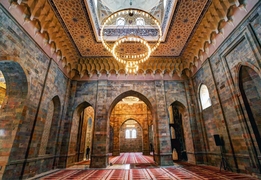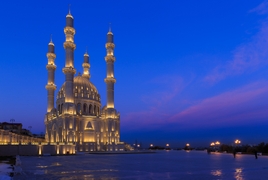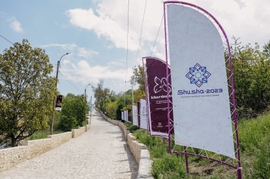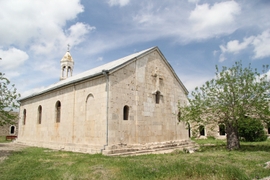Azerbaijan’s President Ilham Aliyev signed an order on Friday declaring the city of Shusha as Azerbaijan’s cultural capital. The city’s new status comes months after its liberation from Armenia's decades-long illegal occupation last year.
Shusha is declared as the cultural capital of Azerbaijan in order to restore the city's historical appearance, to bring its former glory to it and to reunite it with the traditionally rich cultural life, as well as to promote it in the international arena as a pearl of centuries-old rich culture, architecture, and urban planning of Azerbaijan, according to the order published on the Azerbaijani President's official website.
The statement adds that Shusha has historically been one of the important centers of the historical, cultural, socio-political life of Azerbaijan. However, as a result of the military aggression against Azerbaijan, Armenia occupied the city on May 8, 1992, and pursued a policy of destroying the historical and cultural heritage of Azerbaijanis in the city. On November 8, 2020, the city of Shusha was liberated from occupation and historical justice was restored.
Shusha is a key city in the Karabakh (Garabagh) region due to its geographical location and historical significance as one of the major cultural, economic, and administrative centers of Azerbaijan.
Shusha was founded during the reign of the Azerbaijani Karabakh khanate's Panahali khan in the 18th century. According to the historical sources, Panahali khan decided to build an "eternal and invincible fortress in a firm and impassable place in the mountains" given the unfavorable location of the previous castles. Construction of the city kicked off in 1752 at about 1,600 meters above the sea level in Karabakh and the capital of the khanate was moved to the city in 1756-1757.
Shusha has long been one of the main administrative, economic and cultural centers of Azerbaijan since its establishment by indigenous Azerbaijanis. The city has played a key role in the development of Azerbaijan's carpet weaving industry. Shusha was the Karabakh region's carpet-weaving center in the second half of the 19th century and carpets produced in Shusha have been exported to global markets in the late years of the same century. The ornamental and plot groups of Shusha carpets defined the mainline trend in local carpet-weaving. Shusha’s carpet-weavers, Meshedi Bayram Gurban-oglu, Djabbar Haji Akber-oglu, Fatima Aga Sherif-gizi, and Ahmed Dashdamir-oglu took part and won awards in an international show in Paris in 1867. Shusha carpets also received prizes in 1872 in Moscow Polytechnic Exhibition.
At the end of the 18th century, Shusha became one of the important trade centers in the entire South Caucasus region. Merchants brought various goods to Shusha from other Azerbaijani cities such as Baku, Sheki, Nakhchivan and Ganja. The cities of the Ottoman Empire, Russia, Iran, India, and European countries played an important role in Shusha's trade relations. Merchants from Shusha were regular participants at the famous fairs in Leipzig, Germany, and Nizhny Novgorod, Russia.
Shusha is to Azerbaijan what Vienna is to Austria and Naples is to Italy in terms of music. The city is well known as "the temple of Azerbaijani music" and the conservatory of the South Caucasus. The founding father of Azerbaijani composed classical music and opera, Uzeyir Hajibeyli was born in Shusha, a city also home to world-famous Azerbaijani poet Molla Panah Vagif and poetess Khurshudbanu Natavan.
The city of Shusha, built by Azerbaijanis and inhabited by the ethnic Azerbaijani population, faced serious problems after the occupation by Tsarist Russia in the early 19th century. The Russian Empire made a decision to relocate Armenians from Iran and Turkey to Azerbaijani territories, including the Karabakh region, in the wake of a war between 1804-1812. Under the auspices of the Tsarist government, Armenians began to oust Azerbaijanis, who were the Karabakh region's indigenous inhabitants. In 1905-1906, bloody terror and genocide were organized against Azerbaijanis. In 1918-1920, Armenians launched multiple armed attacks on Shusha but failed to occupy the city due to the heroic defense by Azerbaijanis.
With the establishment of the Soviet Union in 1922, Armenians in the Nagorno-Karabakh region of Azerbaijan increased repressions against the indigenous Azerbaijani population of the region. Granting autonomy status to the Nagorno-Karabakh region within Azerbaijan in 1923 and the election of Khankendi as its center, deprived Shusha of its status of Nagorno-Karabakh's administrative center. Subsequently, the quality of life for Azerbaijanis in the city significantly deteriorated, while many historical and architectural monuments belonging to the Azerbaijani people were blown up and destroyed. The population of the city declined by three times in about 50 years. In 1917, Shusha had a population of around 44,000 people, but in 1970, their number decreased to 14,000 following the massive forcible expulsion of ethnic Azerbaijanis.
Following the Soviet Union’s dissolution in 1991, Armenia launched a military campaign against Azerbaijan that lasted until a ceasefire was reached in 1994. Armenia occupied 20 percent of Azerbaijan’s internationally recognized territories, namely the Nagorno-Karabakh region, including Shusha, and seven surrounding districts. Over 30,000 ethnic Azerbaijanis were killed and one million others were expelled from their lands in a brutal ethnic cleansing policy conducted by Armenia.
The Azerbaijani army restored Azerbaijan’s sovereignty over the city of Shusha on November 8 during the 44-day-long counter-offensive operations from September 27 through November 9, 2020. Azerbaijani forces liberated more than 300 settlements, including the cities of Jabrayil, Fuzuli, Zangilan, Gubadli, and Shusha, from nearly 30-year-long illegal Armenian occupation. The liberation of Shusha played a crucial role in the retreat of Armenia’s forces and cessation of hostilities in a ceasefire on November 10. Armenia also returned the occupied Aghdam, Kalbajar, and Lachin districts to Azerbaijan as part of its obligations it took under the ceasefire agreement.


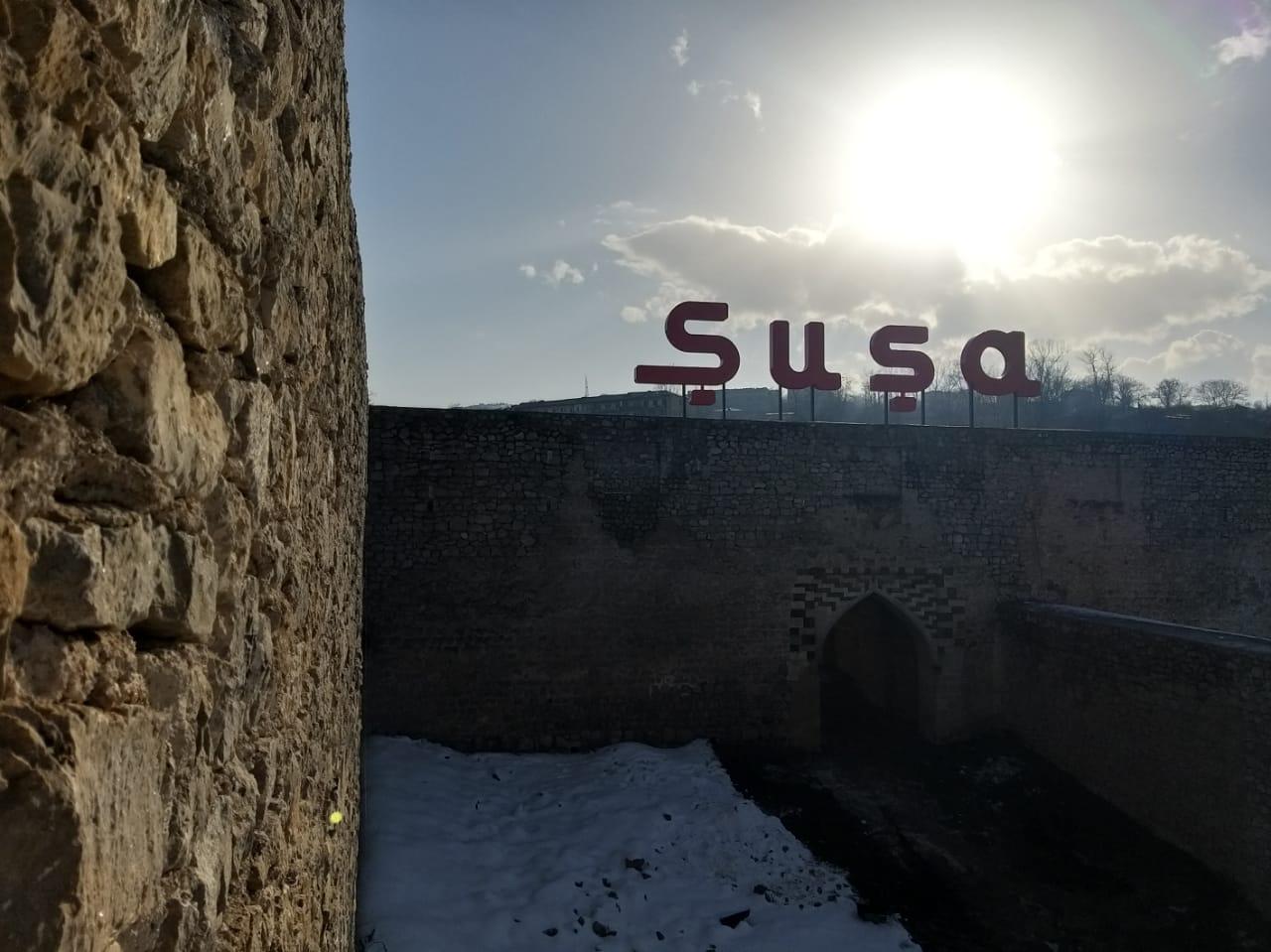




 Iran's senior military leaders described the drone and missile attack on Israel on April 14 night as “successful".
Iran's senior military leaders described the drone and missile attack on Israel on April 14 night as “successful".
 Iran's President Ebrahim Raisi extended condolences to the Chairman of the Political Bureau of the Palestinian Hamas group, Ismail Haniyeh, followi...
Iran's President Ebrahim Raisi extended condolences to the Chairman of the Political Bureau of the Palestinian Hamas group, Ismail Haniyeh, followi...
 The number of evacuees from flooded areas in Kazakhstan has reached 97,852 people, including about 32,856 children since March 27.
The number of evacuees from flooded areas in Kazakhstan has reached 97,852 people, including about 32,856 children since March 27.
